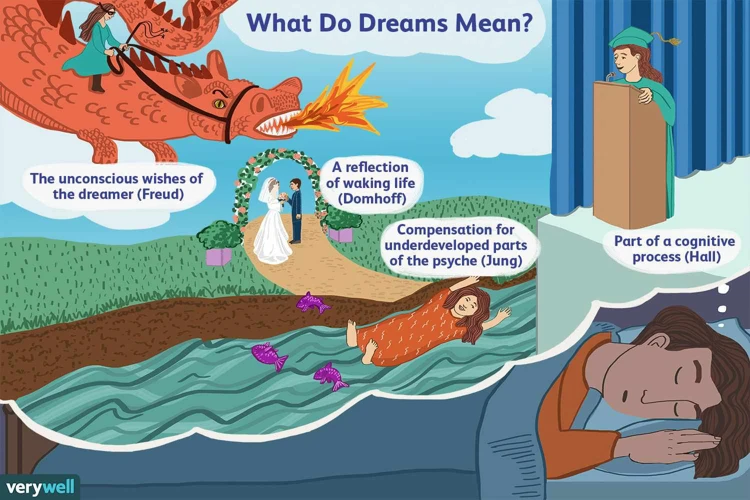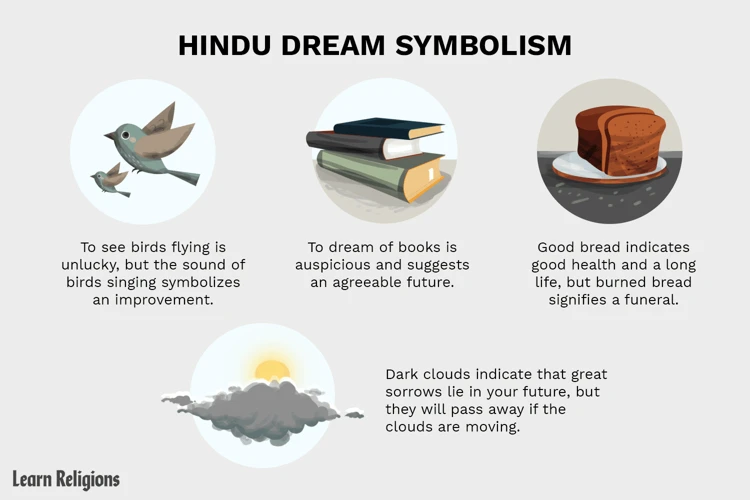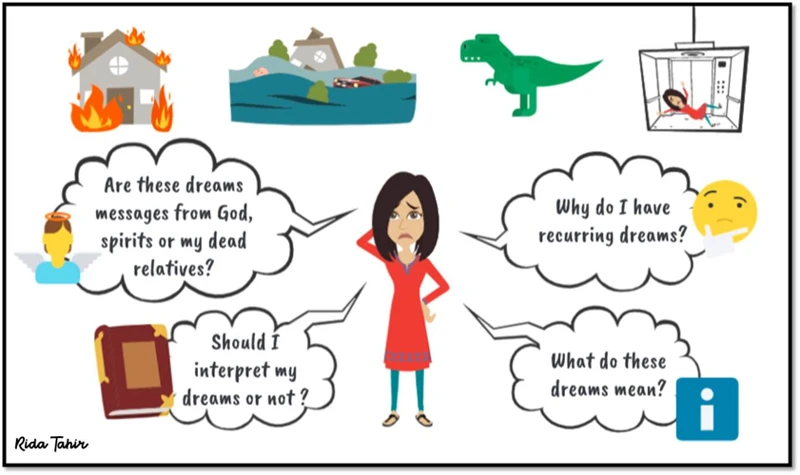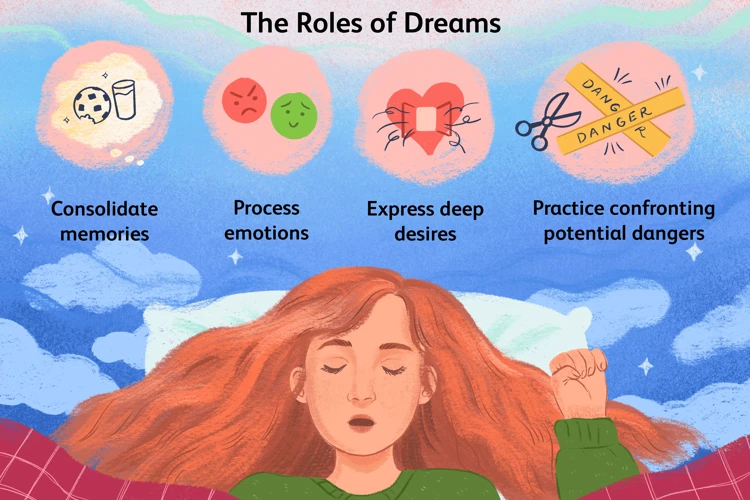What do our dreams mean? It’s a question that has perplexed humanity for centuries. Dreams provide a gateway to our unconscious mind, revealing symbols and imagery that hold deeper meanings. One common theme that often emerges in dreams is the sensation of being lost. This feeling of disorientation, whether in familiar surroundings or unknown territories, represents a symbolic journey of self-discovery and introspection. In this article, we will explore the intricate symbolism of lost dreams, uncover the psychological interpretations behind them, and delve into various ways to navigate this unsettling experience. So, let’s embark on this fascinating exploration of the meaning of being lost in a dream.
Understanding Dreams

Dreams are enigmatic phenomena that hold a deep connection to our subconscious mind, presenting us with a unique portal into our inner thoughts and emotions. They often feature a rich tapestry of symbols and imagery that can be open to interpretation. Dream symbols can range from common objects to fantastical landscapes, each holding its own significance. By exploring and deciphering these symbols, we can gain valuable insights into our own psyche. Whether through vivid narratives, abstract scenes, or fleeting sensations, dreams provide a canvas for our subconscious to express itself. They offer a glimpse into our deepest fears, desires, and unresolved conflicts, serving as a mirror to our internal world. To better understand the meaning of being lost in a dream, we must first delve into the complex realm of dreams themselves.
Dreams: A Gateway to the Unconscious Mind
– Dreams serve as a gateway to the unconscious mind.
– They provide insights into our deepest thoughts, emotions, and desires.
– Symbolism and imagery in dreams can hold significant meaning.
– Dreams offer a canvas for our subconscious to express itself.
– They can reveal unresolved conflicts, fears, and hidden aspects of our psyche.
– Exploring and interpreting dreams can lead to greater self-awareness and personal growth.
Symbolism of Dreams

Dreams are a treasure trove of symbolism, each element serving as a metaphor or representation of our subconscious thoughts and feelings. These symbols can take many forms, from objects and animals to actions and situations. For example, water often symbolizes emotions and the unconscious mind, while flying represents freedom or a desire for escape. Additionally, dreams may incorporate archetypal figures such as the wise old man or the anima/animus, representing different aspects of our personality. These symbols are deeply personal and can vary in meaning from person to person, depending on their individual experiences and beliefs. Understanding the symbolism in dreams requires a keen observation of recurring motifs and patterns, as well as an awareness of personal associations. By exploring these symbols, we can gain valuable insights into our own subconscious thoughts and unravel the hidden messages embedded within our dreams.
Dream Symbols: An Interpretive Journey
– Symbols in dreams serve as a gateway to our unconscious thoughts and emotions.
– Dream symbols can range from familiar objects to abstract concepts.
– Each individual may have unique interpretations and associations with certain symbols.
– Symbols in dreams can be influenced by personal experiences, cultural beliefs, and collective unconscious.
– Analyzing dream symbols involves exploring personal connections and using intuition.
– Symbols in dreams may have multiple layers of meaning and can be open to subjective interpretation.
– Keeping a dream journal can help identify recurring symbols and themes in dreams.
– Consulting dream dictionaries or seeking professional guidance can provide additional insights into dream symbolism.
– Understanding dream symbols can unlock hidden messages and provide deeper understanding of ourselves.
The Intricacies of Being Lost in a Dream

Being lost in a dream is a fascinating and intricate experience that can evoke a range of emotions and sensations. It is a state of disorientation and uncertainty, where the dreamer finds themselves navigating unfamiliar territory or feeling lost in familiar surroundings. The experience of being lost in a dream can be unsettling, as it represents a loss of control and a struggle to find direction. Ambiguous paths and a lack of clear guidance add to the complexity of the dreamer’s journey. The symbolism of being lost in a dream can reflect deeper psychological themes such as a loss of identity, anxiety, and fear. It is a powerful metaphor for the challenges and uncertainties we face in our waking lives, urging us to explore the intricacies of this dream experience and unravel its hidden meanings.
The Unsettling Experience of Being Lost
The sensation of being lost in a dream can be deeply unsettling. It fills us with a sense of confusion, disorientation, and vulnerability. When we find ourselves lost in a dream, we are often overwhelmed by feelings of anxiety and fear. The uncertainty of our surroundings and the lack of familiar landmarks or people can intensify these emotions. We may feel a loss of control and identity, as if we have been disconnected from our sense of self. This unsettling experience can serve as a metaphor for our real-life struggles with uncertainty and the fear of the unknown. It reflects our inner insecurities and the need for direction and purpose in our lives.
Lost in Familiar Surroundings: A Sense of Disorientation
Being lost in familiar surroundings evokes a profound sense of disorientation and confusion. It’s a dream experience where we find ourselves unable to navigate through places we should know well. Suddenly, the streets we have walked countless times become winding mazes, familiar landmarks appear distorted, and once-familiar faces become unrecognizable. This disorienting sensation reflects a deeper psychological state of feeling lost and disconnected in our waking lives. It may indicate a loss of direction or a sense of being trapped in a monotonous routine. The dream invites us to examine our sense of identity and our relationship with our surroundings, encouraging us to explore new paths of self-discovery and rediscover our place in the world.
Ambiguous Paths and Lack of Direction
Ambiguous Paths and Lack of Direction in dreams can evoke a sense of confusion and uncertainty. The dreamer may find themselves wandering through mazes, facing multiple crossroads, or grappling with a lack of clear guidance. These symbols often reflect a similar experience in waking life, where one may feel unsure about which path to take or what decisions to make. The dreamer may be grappling with a difficult choice, a period of transition, or a general feeling of aimlessness. The dream serves as a metaphor for the internal struggle of finding direction and purpose. It prompts the dreamer to reflect on their own decision-making process and encourages them to seek clarity and confidence in their waking life choices.
Psychological Interpretations

Psychological interpretations of being lost in a dream delve into the underlying emotions and fears that this experience may represent. One interpretation suggests that the feeling of being lost reflects a loss of control and identity in waking life. It may symbolize a disconnection from one’s true self or a sense of being overwhelmed by external pressures. Another psychological perspective highlights the presence of anxiety and fear in dreams of being lost. These dreams may be a manifestation of deep-rooted worries or insecurities that are lurking beneath the surface. The uncertainty and confusion associated with being lost in a dream can mirror the feelings of uncertainty and unease that one may experience in waking life. By exploring these psychological interpretations, we can gain valuable insights into the hidden aspects of our psyche and potentially uncover areas for personal growth and self-reflection.
Loss of Control and Identity
- Disempowerment: Being lost in a dream often reflects a sense of loss of control and power. It can indicate a feeling of helplessness or a lack of agency in one’s waking life, where individuals may struggle to assert themselves or make important decisions.
- Identity Crisis: The experience of being lost can also symbolize an identity crisis. It may suggest feelings of confusion or uncertainty about one’s sense of self, purpose, or direction. This can be particularly common during times of transition or personal growth.
- Seeking Autonomy: Alternatively, the loss of control and identity in dreams can be interpreted as a subconscious desire to break free from societal expectations, responsibilities, or limitations. It may signify a yearning for greater independence and self-determination.
- Lack of Confidence: Dreams of being lost can also reflect a lack of self-confidence or self-esteem. It may reveal underlying insecurities or challenges with asserting oneself in various aspects of life, such as relationships, career, or personal pursuits.
Anxiety and Fear
Anxiety and fear are common emotional responses associated with the experience of being lost in a dream. The sense of being disoriented and not knowing where to go can induce a feeling of panic and unease. This can be symbolic of deeper anxieties or insecurities in our waking lives, representing a fear of losing direction or control. The dream may tap into our subconscious fears of being lost, abandoned, or unable to find our way back. This unsettling emotion can serve as a wake-up call, urging us to confront and address the source of our anxieties in order to find a sense of peace and stability.
Personal Reflections

Personal reflections play a crucial role in understanding the significance of being lost in a dream. When we explore our own experiences and emotions within a dream, we can uncover subconscious fears, insecurities, and unresolved issues that may be influencing our waking lives. Through self-reflection, we can analyze the emotions and reactions we had while being lost in a dream, allowing us to make connections between our dream world and our waking experiences. Additionally, reflecting on the location of the dream can provide valuable insights. For example, if we find ourselves lost in a familiar place, it may indicate feelings of being trapped or stagnant in our daily lives. On the other hand, being lost in an unfamiliar place could represent a fear of the unknown or a sense of disorientation in navigating new challenges. Exploring our emotional states and stress levels during the dream can also shed light on the underlying factors contributing to the feeling of being lost. By engaging in personal reflections and introspection, we can unravel the layers of symbolism in our dreams and gain a deeper understanding of our inner selves.
Exploring Subconscious Fears and Insecurities
Exploring Subconscious Fears and Insecurities
– Dreams of being lost can often be a reflection of deeper fears and insecurities that reside in our subconscious mind.
– The experience of feeling lost in a dream may symbolize a lack of direction or purpose in our waking lives, highlighting uncertainties and anxieties.
– It is important to pay attention to the emotions and sensations that arise during these dreams, as they can provide valuable insights into our hidden fears and struggles.
– By delving into the symbolism and context of the dream, we can gain a better understanding of the specific fears and insecurities that may be affecting us on a subconscious level.
– Exploring these fears in a safe and reflective manner can lead to personal growth and self-awareness, allowing us to address and overcome these challenges in our waking life.
The Significance of the Location
In the realm of dreams, the significance of the location holds a profound meaning. The specific setting where we find ourselves lost can provide valuable insights into the emotions and experiences we may be grappling with in our waking lives. For example, being lost in a familiar place triggers a sense of disorientation and confusion, highlighting the potential loss of direction or feeling lost in our everyday lives. On the other hand, being lost in an unfamiliar location signifies venturing into uncharted territories or facing new challenges. The location serves as a symbol that reflects our internal state and can offer clues to our subconscious fears, desires, and aspirations. By paying attention to the details of the dream’s location, we can gain a deeper understanding of the messages our subconscious is trying to convey.
Emotional States and Stress
Emotional states and stress play a significant role in the experience of being lost in a dream. When we feel overwhelmed, anxious, or stressed in our waking lives, these emotions can manifest in our dreams as well. Being lost in a dream may reflect a sense of being overwhelmed or lost in our own emotions. It can symbolize a state of confusion or a lack of direction in dealing with challenging situations or personal struggles. The dream might be a subconscious reflection of the need to address and navigate through these emotional states in our waking life. By exploring the emotions connected to being lost in a dream, we can gain a deeper understanding of our psychological well-being and the ways in which stress impacts our subconscious mind.
Common Variations of Being Lost in a Dream

Being lost in a dream can manifest in various intriguing variations, each carrying its own unique connotations and interpretations. One common variation is the feeling of being lost in an unfamiliar place, where the dreamer navigates through unknown terrain and attempts to find their way back to familiarity. This symbolizes a sense of uncertainty and the need for guidance in real-life situations. Another variation involves being lost in a crowd, where the dreamer feels overwhelmed and disconnected, highlighting feelings of isolation and a need for individuality. Additionally, getting lost in a maze or labyrinth signifies a complex journey and the need for problem-solving and perseverance. These variations of being lost in a dream offer valuable insights into different aspects of one’s life, emotions, and subconscious fears and desires.
Lost in an Unfamiliar Place
Lost in an unfamiliar place is a common variation of being lost in a dream. This dream scenario often evokes feelings of uncertainty, vulnerability, and a sense of disconnection from one’s surroundings. It may represent a fear of the unknown or a sense of being out of place in a new or unfamiliar environment. The unfamiliar place could symbolize a new phase in life, a challenging situation, or a need to adapt to unfamiliar circumstances. The dream may be a reflection of one’s anxieties and insecurities about navigating uncharted territory. It can also serve as a reminder to embrace change and approach new experiences with curiosity and an open mind.
Lost in a Crowd
The sensation of being lost in a crowd is a common variation of lost dreams. In these dreams, an individual finds themselves surrounded by an overwhelming sea of faces, feeling disconnected and invisible amidst the bustling masses. This dream symbolizes a sense of social isolation, the fear of losing one’s identity in a large group, or the struggle to stand out and be recognized. It may reflect feelings of insignificance or a desire for individuality and uniqueness. Being lost in a crowd can also point to a need for connection or a fear of being overlooked or forgotten. It invites us to examine our relationships, our sense of belonging, and our need for validation in the world.
Lost in a Maze or Labyrinth
Lost in a maze or labyrinth is a common variation of being lost in a dream. It represents a complex journey filled with twists, turns, and countless paths to choose from. The maze symbolizes the challenges and obstacles we face in life, often leaving us feeling lost and disoriented. Navigating through the intricate corridors and dead ends of a maze in a dream reflects our quest for direction and purpose. This dream motif may indicate a need for finding clarity or making decisions amidst a confusing and overwhelming situation. It encourages us to persevere, trust our instincts, and seek out the correct path to reach our goals.
Popular Interpretations

When it comes to the popular interpretations of being lost in a dream, there are two main perspectives that often emerge: existential reflections and motivational perspectives. From an existential standpoint, being lost in a dream represents the search for meaning and purpose in life. It symbolizes the deeper existential questions we grapple with, such as “Who am I?” and “What is my place in the world?” The experience of being lost becomes a metaphor for navigating the uncertainties and complexities of existence. On the other hand, from a motivational perspective, being lost in a dream can be seen as a metaphor for overcoming challenges and obstacles. It becomes a call to action, inspiring individuals to find their way and regain control in their waking lives. This interpretation encourages individuals to embrace the sense of adventure and resilience needed to conquer adversity. Ultimately, these popular interpretations offer different lenses through which we can understand and make sense of the meaning of being lost in a dream.
Existential Reflections: The Search for Meaning
Existential reflections in dreams encompass a profound search for meaning and purpose in life. When experiencing the unsettling sensation of being lost in a dream, it can trigger a contemplation of existential questions such as “Who am I?” and “What is my purpose?” This theme often arises when individuals are at crossroads or facing significant transitions in their waking lives. Being lost in a dream can prompt introspection and a deeper exploration of one’s values, beliefs, and overall sense of self. It presents an opportunity to reflect on the path one is currently on and evaluate whether it aligns with their authentic desires and aspirations. The symbolism of being lost in a dream can serve as a catalyst for deep existential pondering and a quest for personal meaning.
Motivational Perspectives: Overcoming Challenges
Motivational Perspectives: Overcoming Challenges focuses on interpreting the symbol of being lost in a dream as a metaphor for overcoming obstacles and persevering through adversity. In this perspective, being lost represents a state of uncertainty and confusion, mirroring the challenges we face in our waking lives. Dreaming of being lost can serve as a powerful reminder that setbacks and detours are a natural part of any journey towards success. By embracing the unknown, cultivating resilience, and maintaining a positive mindset, we can navigate these dream scenarios as opportunities for growth and personal development. Through this lens, the symbolism of being lost in a dream becomes a catalyst for motivation and an invitation to embrace challenges with determination and perseverance.
Ways to Navigate Being Lost in a Dream

Navigating the experience of being lost in a dream can be a perplexing and unsettling ordeal. However, there are ways to navigate and make sense of this enigmatic journey. One approach is to embrace the unknown and cultivate curiosity. Instead of allowing fear or confusion to overwhelm us, we can adopt an attitude of exploration and intrigue. By approaching the dream with a sense of curiosity, we can unlock new insights and meanings hidden within the symbolism of being lost. Another valuable strategy is practicing self-reflection and self-discovery. Engaging in introspection allows us to uncover any underlying fears, insecurities, or unresolved emotions that may be manifesting in the dream. This process can lead to personal growth and a deeper understanding of ourselves. Lastly, seeking guidance and support can be beneficial. Whether through discussing the dream with a trusted friend or seeking the expertise of a professional dream interpreter, external perspectives can shed light on different interpretations and provide valuable insights. By utilizing these approaches, we can navigate the experience of being lost in a dream and uncover the wisdom it holds.
Embracing the Unknown: Cultivating Curiosity
Embracing the unknown in our dreams involves cultivating curiosity and open-mindedness. Rather than fearing being lost in a dream, we can choose to approach it with a sense of wonder and fascination. By embracing the unfamiliar, we can tap into our natural curiosity and explore the hidden depths of our subconscious. Cultivating curiosity allows us to view being lost as an opportunity for growth and self-discovery. It encourages us to ask questions, seek answers, and delve into the symbolism and meaning behind our dreams. By adopting a curious mindset, we can navigate the unknown with a sense of excitement and anticipation, unearthing hidden treasures within our dreamscape.
Self-Reflection and Self-Discovery
Self-reflection and self-discovery play a crucial role in navigating the experience of being lost in a dream. Through introspection, we can gain a deeper understanding of ourselves and the underlying emotions that manifest in our dreams. Taking the time to reflect on the symbolism and themes present in our dream of being lost can reveal hidden aspects of our personality, fears, and desires. By engaging in self-discovery practices such as journaling, meditation, or therapy, we can uncover patterns and recurring motifs in our dreams that may provide valuable insights into our waking life. Through this process of self-reflection, we can piece together the messages and lessons that our dreams are presenting to us, promoting personal growth and self-awareness.
Seeking Guidance and Support
– Connecting with a therapist or counselor who specializes in dream analysis can provide valuable insights and guidance in interpreting and understanding the meaning of being lost in a dream. Their expertise can help unravel the deeper layers of symbolism and provide a fresh perspective on the significance of the dream.
– Engaging in peer support groups or online forums dedicated to dreams and dream interpretation can offer a sense of community and shared experiences. Sharing dreams with others who have similar experiences can provide different perspectives and interpretations, fostering a sense of validation and understanding.
– Seeking guidance and support from spiritual advisors or mentors who have knowledge and expertise in dream interpretation can provide a spiritual perspective on the meaning of being lost in a dream. They can guide individuals in connecting the dream symbolism to their personal beliefs and spiritual journey.
– Exploring self-help resources such as books, podcasts, and online courses on dream analysis and interpretation can be an accessible way to gain insights and guidance in understanding the meaning of being lost in a dream. These resources can offer various techniques and frameworks for exploring dreams and provide practical steps for self-reflection and interpretation.
Dream Analysis Techniques
When it comes to analyzing our dreams, there are various techniques that can aid in unraveling their hidden meanings. One effective approach is keeping a dream journal, where you record your dreams immediately upon waking. This helps capture the details, emotions, and symbols fresh in your mind, allowing for later reflection and interpretation. Reflective writing can also be a valuable tool, where you delve deep into the imagery and symbolism present in your dreams, uncovering connections and exploring the underlying themes. Seeking the guidance of a professional dream interpreter can provide further insights, as they possess the expertise and experience to decode the intricate layers of your dreams. By combining these techniques, you can embark on a journey of self-discovery, unraveling the mysteries of your dreams and gaining a deeper understanding of the meaning of being lost in the realm of dreams.
Journaling and Reflective Writing
Journaling and reflective writing provide powerful tools for delving deeper into the meaning of being lost in dreams. By keeping a dream journal, you can create a record of your dreams, capturing details, emotions, and any insights that arise. This process allows you to revisit and reflect upon your dreams, drawing connections and patterns over time. Through writing, you can explore different perspectives, question assumptions, and gain a clearer understanding of the symbolism present in your dreams. Reflective writing prompts can help guide your exploration, encouraging you to delve into the emotions, thoughts, and experiences associated with being lost in your dreams. By engaging in this introspective practice, you can uncover personal insights, deepen self-awareness, and unravel the hidden messages within your dreams.
Dream Interpretation with a Professional
– Consulting with a professional dream interpreter can provide valuable insights into the meaning of being lost in a dream. These experts have a deep understanding of symbolism and can help decipher the hidden messages within your dreams.
– A dream interpretation session typically involves discussing the details and emotions associated with your dream. The professional will guide you through a process of exploration and reflection, helping you uncover the underlying meanings and connections.
– By sharing your dream with a professional, you can gain a fresh perspective and discover new insights about yourself. They can offer interpretations based on their knowledge of psychology, mythology, and the human psyche.
– Keep in mind that dream interpretation is a subjective process, and different professionals may have different interpretations of the same dream. It’s important to find a reputable and experienced interpreter who resonates with you and your unique experiences.
Conclusion
– Summarize the key points discussed in the article, such as the symbolism of being lost in a dream, the psychological interpretations, personal reflections, common variations, and popular interpretations.
– Emphasize the importance of self-reflection and exploration when it comes to understanding dreams and their meaning.
– Encourage readers to embrace the unknown, cultivate curiosity, and seek guidance and support in navigating the complexities of their dream experiences.
– Highlight the value of dream analysis techniques such as journaling, reflective writing, and seeking professional interpretation.
– Conclude by emphasizing that dreams are unique to each individual and that exploring their deeper meanings can lead to personal growth and self-discovery. Harnessing the power of dreams as a tool for introspection can unlock hidden aspects of ourselves and provide valuable insights into our subconscious minds.
Frequently Asked Questions
Why do we dream?
Dreams serve as a way for our minds to process and integrate experiences, emotions, and memories from our waking lives. They also provide a space for the subconscious mind to communicate and express itself.
Can dreams predict the future?
While some individuals claim to have experienced prophetic dreams, there is no scientific evidence to suggest that dreams can reliably predict the future. Dreams are more closely linked to our internal thoughts and emotions.
Why can’t we always remember our dreams?
Dreams occur during the rapid eye movement (REM) stage of sleep, a phase associated with more vivid and complex dreaming. However, we often forget our dreams because the brain processes and discards information during the transition from sleep to wakefulness.
Do animals dream?
Yes, studies have shown that many animals, including mammals and birds, experience REM sleep, which is strongly associated with dreaming. While we can’t know for certain what they dream about, their brain activity during REM sleep suggests some level of dreaming.
Why do some dreams feel so real?
During dreams, our brain creates a virtual reality that activates the same brain regions implicated in sensory perception. This can make the dream experience feel incredibly vivid and life-like, blurring the boundaries between the dream world and waking reality.
Can nightmares have a positive meaning?
Despite the negative emotions they evoke, nightmares can sometimes have positive meanings. They may serve as a warning signal, encouraging us to address underlying fears or unresolved issues in our lives. They can also provide an opportunity for personal growth and self-reflection.
Can lucid dreaming be learned?
Lucid dreaming, the ability to be aware that you are dreaming within a dream, can be cultivated and developed through various techniques. Practices such as reality checks, meditation, and keeping a dream journal can increase the likelihood of experiencing lucid dreams.
Why do recurring dreams happen?
Recurring dreams often reflect unresolved issues or recurring patterns in our lives. They can be an invitation to explore and address hidden fears, anxieties, or unresolved conflicts that need to be acknowledged and resolved.
Can dreams help with problem-solving?
There is evidence to suggest that dreams can aid in problem-solving and creative thinking. Dreams may provide fresh perspectives, allowing us to approach challenges from different angles and potentially find innovative solutions.
Do all dreams have symbolic meanings?
While dreams frequently contain symbolic elements, not all dreams necessarily have deep or symbolic meanings. Some dreams may simply be a reflection of our thoughts, memories, and experiences from the day without significant hidden symbolism.


